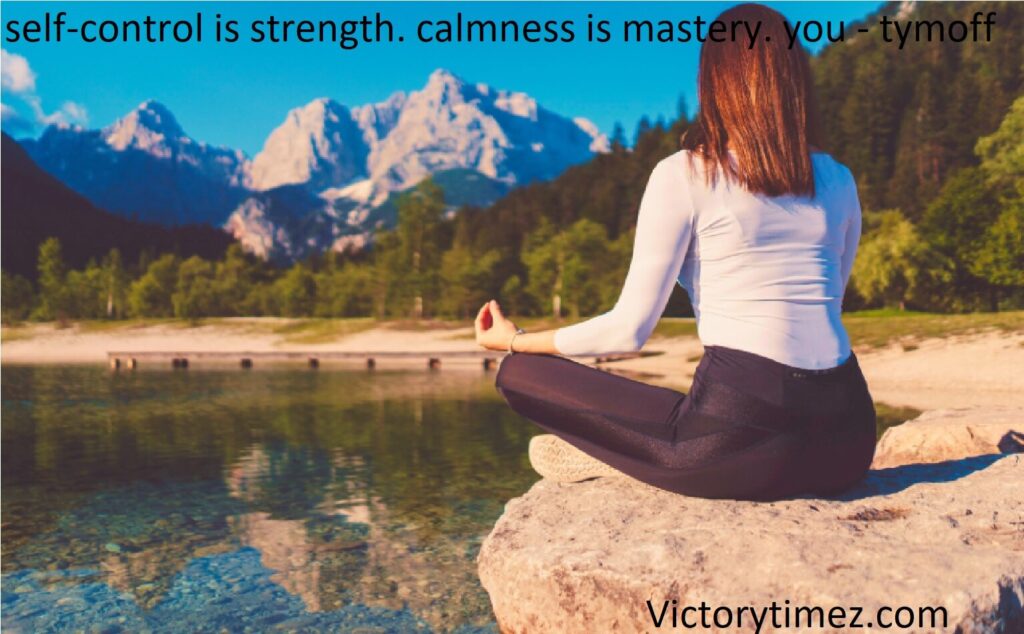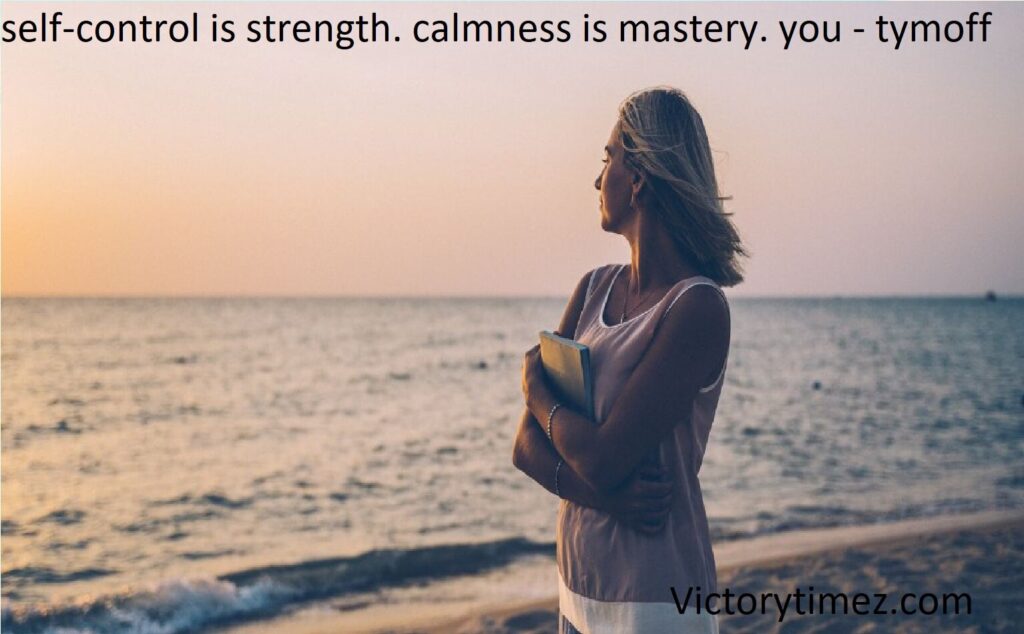
self-control is strength. calmness is mastery. you – tymoff in today’s fast-paced world, it’s easy to lose ourselves in distractions and emotions. However, some principles remain timeless and universal. Tymoff’s quote, “Self-control is strength. Calmness is mastery. You,” offers wisdom that is highly relevant. These concepts of self-control and calmness are crucial, not just for success but for a well-rounded, peaceful life. In this article, we’ll explore the meaning of this quote and how mastering these two virtues can lead to personal growth and mental clarity.
Understanding self-control is strength. calmness is mastery. you – tymoff
Defining Self-Control
self-control is strength. calmness is mastery. you – tymoff is the ability to regulate your thoughts, emotions, and actions in the face of temptations and impulses. It’s about making choices that align with your long-term goals instead of succumbing to immediate desires. Whether it’s resisting the urge to eat junk food or staying composed in a heated argument, self-control empowers you to navigate life with intention and purpose.
Why Self-Control is Considered Strength
Why is self-control seen as strength? It’s because controlling your impulses and emotions requires immense mental discipline. It’s easy to give in to your impulses, but it takes real strength to stay in control. In moments of stress, frustration, or temptation, self-control gives you the power to stay composed and make thoughtful decisions, rather than impulsive reactions.
Real-Life Examples of Self-Control as Strength
From athletes maintaining strict training schedules to business leaders who keep their calm in high-stakes situations, self-control is the invisible force that helps people achieve their goals. Think of someone like a marathon runner, who pushes past fatigue to finish a race. That’s self-control in action, demonstrating mental fortitude. self-control is strength. calmness is mastery. you – tymoff
The Role of Emotions in Self-Control
Managing Emotions with Self-Control
Emotions are powerful, and they can either fuel your progress or hinder it. Managing emotions through self-control is not about suppressing them but understanding and channeling them effectively. This ability to temper emotional responses can prevent rash decisions and unnecessary conflicts.
The Balance Between Impulse and Reason
One of the biggest challenges we face is balancing impulse with reason. Self-control helps to bridge this gap, allowing us to evaluate situations logically rather than emotionally. It’s the difference between reacting and responding. By exercising self-control, you can pause and think before acting, ensuring that your actions align with your values and goals. self-control is strength. calmness is mastery. you – tymoff

The Importance of Calmness
What Does Calmness Mean in Practice?
Calmness isn’t the absence of stress or chaos; rather, it’s the ability to maintain peace of mind even amidst turmoil. Calmness in practice means having the mental clarity to deal with challenges without becoming overwhelmed or anxious. It’s about being centered and grounded, no matter the external circumstances. self-control is strength. calmness is mastery. you – tymoff
How Calmness Leads to Mastery
Mastery in any field requires a level head. Whether you’re learning a new skill or navigating a tough situation, calmness enables you to think clearly, make better decisions, and respond more effectively. People who remain calm under pressure often outperform those who panic or rush into action without considering the consequences. self-control is strength. calmness is mastery. you – tymoff
Calmness in High-Pressure Situations
self-control is strength. calmness is mastery. you – tymoff Think about professionals who handle high-stress jobs like surgeons, pilots, or firefighters. In these roles, staying calm is not just a preference; it’s a necessity. When you’re calm, you can assess situations more clearly and make critical decisions without letting stress cloud your judgment.
Developing Calmness as a Skill
Techniques to Cultivate Calmness
Calmness can be cultivated with the right mindset and practices. Simple techniques such as deep breathing, mindfulness, and meditation can train your brain to remain steady during stressful moments. By practicing these techniques regularly, you build a foundation of calm that you can rely on when life gets chaotic. self-control is strength. calmness is mastery. you – tymoff
Mindfulness and Meditation
Mindfulness and meditation are two of the most effective tools for developing calmness. These practices teach you to focus on the present moment and accept it without judgment. Over time, this reduces anxiety and enhances your ability to stay calm in difficult situations.
The Power of Patience
Patience is an often overlooked aspect of calmness. When you cultivate patience, you’re less likely to feel rushed or pressured, which in turn allows you to approach challenges with a clearer mind.
How Self-Control and Calmness Interconnect
The Symbiotic Relationship Between Control and Calm
self-control is strength. calmness is mastery. you – tymoff and calmness go hand in hand. When you’re able to control your emotions and impulses, you naturally become calmer. Similarly, calmness allows you to maintain self-control in situations that would otherwise trigger emotional reactions.
The Mental and Emotional Benefits
By mastering self-control and calmness, you enjoy a host of mental and emotional benefits. These include reduced stress, better decision-making, improved relationships, and a greater sense of inner peace.
Practical Tips for Building Self-Control
Daily Habits to Strengthen Self-Control
Start with small, manageable habits, like sticking to a daily schedule or setting boundaries on distractions. These small acts of discipline build your capacity for self-control over time.
The Role of Discipline in Self-Control
Discipline is the foundation of self-control. By practicing discipline in various aspects of life—be it diet, exercise, or work habits—you strengthen your ability to maintain control in challenging situations.
Challenges You May Face
Building self-control isn’t easy, and you will face setbacks. However, it’s important to view these challenges as opportunities for growth. Every time you resist temptation or stay calm in a difficult moment, you strengthen your self-control muscle. self-control is strength. calmness is mastery. you – tymoff
How Calmness Empowers Leadership
Leaders Who Exemplify Calmness
Great leaders like Nelson Mandela and Mahatma Gandhi demonstrated calmness in the face of adversity. Their ability to remain calm and composed allowed them to lead effectively and inspire others. self-control is strength. calmness is mastery. you – tymoff
The Impact of Calmness in Decision-Making
Calm leaders make better decisions because they can think clearly, even under pressure. When you are calm, you are more likely to assess all options and make informed choices.
Self-Control and Calmness in Personal Growth
Using Self-Control for Personal Discipline
Self-control is essential for personal growth. Whether it’s adopting new habits or letting go of unhelpful ones, self-control provides the discipline needed to improve yourself.
How Calmness Helps in Personal Relationships
self-control is strength. calmness is mastery. you – tymoff plays a significant role in personal relationships. When you approach conflicts with calmness, you foster better communication and understanding, which strengthens the bond between individuals.
Why Tymoff’s Quote Resonates
Breaking Down the Quote
Tymoff’s quote—”Self-control is strength. Calmness is mastery. You”—captures the essence of personal empowerment. Self-control is the strength that helps you resist distractions, while calmness is the mastery that allows you to navigate life with grace.
Applying Tymoff’s Insights in Daily Life
Incorporating this wisdom into your daily life can lead to immense personal growth. Whether it’s in your professional life or personal relationships, practicing self-control and calmness will enhance your well-being and success.
Conclusion
self-control is strength. calmness is mastery. you – tymoff are two of the most powerful tools you can develop in life. By mastering these, you not only gain strength and mental clarity but also improve your ability to handle stress, make decisions, and foster meaningful relationships. Embracing Tymoff’s philosophy can truly transform the way you live and interact with the world.
FAQs
What is the significance of self-control in life?
self-control is strength. calmness is mastery. you – tymoff helps you make decisions that align with your long-term goals, resist impulsive behavior, and maintain focus on what’s truly important.
How does calmness contribute to mastery?
Calmness allows you to think clearly and act effectively, even in stressful situations, which is essential for mastering any skill or challenge.
Can anyone develop strong self-control?
Yes, self-control is a skill that can be developed through practice, discipline, and mindfulness.
How do self-control and calmness relate to mental health?
Both self-control and calmness contribute to lower stress levels, improved emotional regulation, and better overall mental health.
What are the challenges in cultivating calmness?
Challenges include managing stress, impatience, and external pressures, but with consistent practice, calmness can be achieved over time.